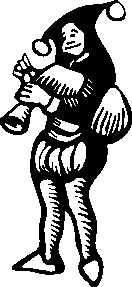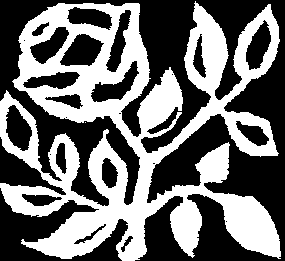Welcome!
 This site is intended to be a learning aid for the casts of Renaissance Faires and Festivals. Here you will find lots of information covering History, Costume, and Dialect, plus some handy tips on how to survive a Faire Day. It is designed for use in a theatrical setting rather than in a re-enactment or scholarly setting. I have verified the accuracy of the information found here as much as possible, but please keep in mind that there is a certain amount of artistic license involved. In other words, don't quote this site in your history papers without checking the info yourself!
This site is intended to be a learning aid for the casts of Renaissance Faires and Festivals. Here you will find lots of information covering History, Costume, and Dialect, plus some handy tips on how to survive a Faire Day. It is designed for use in a theatrical setting rather than in a re-enactment or scholarly setting. I have verified the accuracy of the information found here as much as possible, but please keep in mind that there is a certain amount of artistic license involved. In other words, don't quote this site in your history papers without checking the info yourself!
Also, I should mention here that although I have been greatly influenced by my work at various shows, none of them are in any way responsible for any of the content on this site. All opinions and attitudes expressed here are my own (except of course for those on "external" links, which belong to the authors of those pages, and should appear in their own browser windows). If you have a beef with this site, I want to know, so write to me! I'll be happy to read any reasonable critiques or suggestions you may have.
How is the Site Arranged?
The site is divided into several sections: History, Character Research, Costume, Dialect, and Survival. Each section will contain both original material and links to other sites which have additional information. To move around the site, just click on any of the links in the navigation frame at the top (or at the bottom of the page, if your browser does not support frames).
But first, some basic information about the premise of a Festival day that everyone needs to know...
Where Are We?
Most Faires and Festivals (I use the two terms interchangably) take place in little villages somewhere in England. This makes a certain amount of practical sense, since it's a darn sight easier to build a village than a full-blown city like, say, London.
Some shows are "tent Faires," meaning that they have primarily non-permanent buildings. Sometimes these shows use the premise of a village, but they are more likely to think of themselves as market faires.
There are a few shows that are non-English, but they are a distinct minority in the US, for obvious cultural and linguistic reasons. For this reason, I'm concentrating on the English setting here.
What Are We Doing Here?
Ah, philosophy! The purpose of a Renaissance Festival is to entertain our customers by creating the illusion of a Sixteenth-century village. Everything we do is in the service of that illusion. The more we know about the Period, the stronger that illusion becomes, and the more we entertain our guests. This site is intended to help you find as much information as possible to help you in that mission.
So What Year is it, Anyway?
Well...That depends on the show. Shows generally fall into five categories:
- Historical - These shows have a fixed year, and try to keep as much as possible to that year. They are usually either Henrician (concentrating on the reign of Henry VIII), or Elizabethan (concentrating on the reign of Elizabeth I), although other periods are certainly possible. This is my favorite type of show for a couple of reasons. First of all, I'm a history geek, and I love to play with the stuff. Second, I believe that it gives us a far more interesting show if we can create drama that is firmly based in history. The disadvantage to these shows is that they are a lot harder to do, requiring considerably more time commitment in terms of research and preparation.
- Fictional - The exact year of these shows is flexible. Generally, these shows have an imaginary Monarch, but stick to "reality" for their characters. In other words, no fairies or other fantasy characters.
- Legendary - These are the King Arthur and Robin Hood shows. They have very little to do with history, but boy are they fun! These shows have the distinct advantage that a much greater percentage of the audience already knows the characters and basic storyline.
- Fantasy - These shows abandon history entirely, and try to create a fantasy setting, complete with elves, fairies, etc. My opinion is that these shows, even when well done, just don't work anymore. I say this not to disparage anyone's work (I have seen some pretty darned impressive fairies, for example), but because it is my feeling that we cannot create an experience for our audience that can compete with modern special effects techniques. With our audience now becoming used to computer-generated realistic special effects in movies and on TV, no matter what we do, we cannot be seen as anything other than people in costumes.
- Kitchen-Sink - These are the shows that drive me nuts. They take everything you've ever seen in a movie, from faries to Robin Hood to Queen Elizabeth to Musketeers, and throw it all together. I've worked a couple of these, and they can be made to work, given a large enough site, but they make me crazy, simply because there is usually little, if any, consistency. Yes, this is pet peeve of mine. My feeling is, if you're going to be a historical show, be that. If you're going to be a legendary or fantasy show, fine, but pick one!
Anyway, the broad time period for most shows is the English Renaissance. This gives us about a 120-year window to play in, from 1485 to 1603. Some shows us an earlier, medieval setting, and some use a later time period, to take advantage of the Musketeer or Pirate image.
A brief word about historical accuracy: depending on the show, we may not be bound to a particular year. At most shows, we have a window of historical time that spans about a century-and-a-half. This gives us quite a bit of leeway as to the specifics of our costumes and characters. However, we have to be careful not to interpret this leeway as a license to commit anachronisms. Our guests come to see the Renaissance, so let's give them the Renaissance! Some anachronisms are inevitable, though. Here is a set of guidelines for the uses of anachronism.
All right, now that you know the basic situation, let's get down to business. Pick a section, and dive right in!
 This site is intended to be a learning aid for the casts of Renaissance Faires and Festivals. Here you will find lots of information covering History, Costume, and Dialect, plus some handy tips on how to survive a Faire Day. It is designed for use in a theatrical setting rather than in a re-enactment or scholarly setting. I have verified the accuracy of the information found here as much as possible, but please keep in mind that there is a certain amount of artistic license involved. In other words, don't quote this site in your history papers without checking the info yourself!
This site is intended to be a learning aid for the casts of Renaissance Faires and Festivals. Here you will find lots of information covering History, Costume, and Dialect, plus some handy tips on how to survive a Faire Day. It is designed for use in a theatrical setting rather than in a re-enactment or scholarly setting. I have verified the accuracy of the information found here as much as possible, but please keep in mind that there is a certain amount of artistic license involved. In other words, don't quote this site in your history papers without checking the info yourself!





